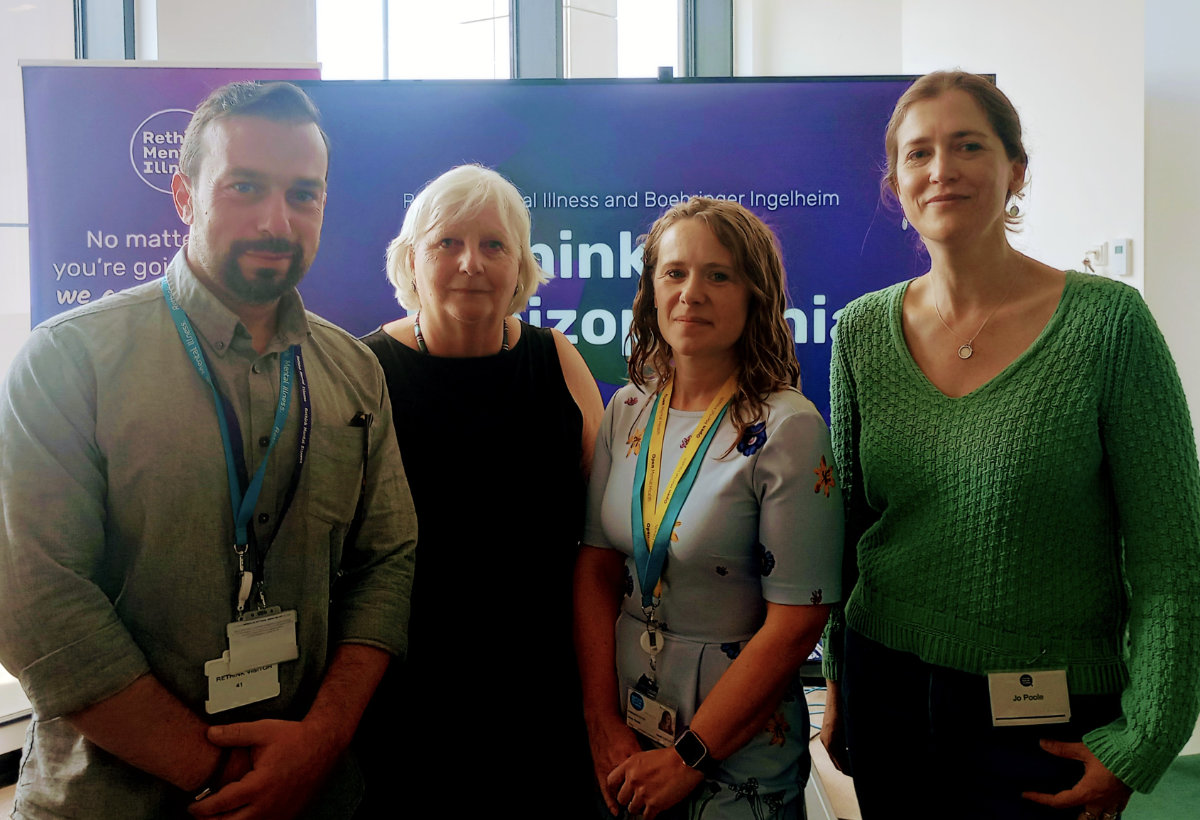
Friday 25th July 2025 marks National Schizophrenia Awareness Day, but how much do you know about this complex mental illness that affects how people think, feel, and behave? Schizophrenia affects around 1 in 100 people, and while its symptoms can vary greatly, public perception is often clouded by misinformation.
We spoke with two NHS Experts by Experience, Ros, 58, and Andrew, 54, who have lived experience of schizophrenia, to offer a clearer, more personal understanding of the condition.
Dispelling Myths
Ros’s journey with schizophrenia began at 19, though she wasn’t diagnosed until 22. “I had three and a half years feeling terrible. No one could figure it out. Eventually, it became psychosis, and I was hearing voices,” she says. Her immediate reaction was very negative and based on a common misconception: “First thing I thought was, am I gonna go round killing people? Because that’s the impression you get from the press.”
This fear is fuelled by persistent myths. Schizophrenia doesn’t mean someone has a “split personality”—that’s a misunderstanding of the word’s Greek origins, meaning “split mind.” It’s important to note that typically, people with schizophrenia aren’t dangerous. As Ros emphasises, “When I am ill, it is scary for me and others. But there is a difference. Criminal schizophrenia is something else. It’s not the same as regular schizophrenia. I’d really like people to understand that we are nice people, not horrible. It is a temporary state.” In fact, individuals with schizophrenia are far more likely to be harmed by others than to cause harm themselves.
Another widespread myth is that you can’t work if you have schizophrenia. While symptoms can certainly impact daily life, many people with the right support can and do work. Andrew was a carpet fitter for many years; at the age of 28, he was diagnosed with paranoid schizophrenia. While periods of ill-health have at times restricted his work and eventually taken his professional interests in a different direction, Andrew is very busy; in addition to the role he has as a Recovery Partner, Andrew does voluntary work each week and hopes to get a job on a psychiatric ward.
Ros experienced the devastating impact of this misconception firsthand: “I was forced to retire. I was devastated. But the money worries that leads to are stressful.” She passionately believes that people with mental health issues, just like those with physical health problems, should be respected when they’re unable to work, without the added burden of stigma. As she puts it, “It would be nice to think that people didn’t look at us as scroungers.”
Despite periods where she couldn’t work in a traditional role, Ros has consistently stayed active and contributed to her community. She was twice elected to her local council and even volunteered as an MP’s assistant. Today, she uses her hard-won knowledge about mental health as an Expert by Experience to support the NHS, with a focus on improving the discharge process for patients.
Schizophrenia Symptoms and the Path to Recovery
Schizophrenia symptoms are often categorised as “positive” or “negative,” but these terms don’t mean good or bad. Positive symptoms are experiences added to reality, like:
- Hallucinations: Seeing, hearing, smelling, or feeling things others don’t. While often distressing, this is not always the case, Ros says: “My voices have always told me to help other people.” Hearing voices is the most common type of hallucination.
- Delusions: Strong beliefs not based in reality. For Ros, this has sometimes manifested as paranoia: “I can be horrible to be around when I’m unwell, as I become concerned about spies. I feel like I need to protect people from the CIA.”
- Muddled thinking: Difficulty concentrating, thoughts jumping, or speech becoming jumbled.
- Negative symptoms involve a loss of abilities and enjoyment, like a lack of motivation, losing interest in activities, or social withdrawal. Cognitive impairment, affecting memory and decision-making, is also a type of negative symptom.
Diagnosing schizophrenia involves a psychiatrist assessing symptoms over time, as there’s no single test. Ros says: “It would have been great if I’d had a clear diagnosis earlier. It was really scary.”
Andrew recalls how overwhelming it can be to receive a schizophrenia diagnosis: “It’s very difficult to understand from day one.” Treatment typically involves a combination of medication, often antipsychotics, and talking therapies like Cognitive Behavioural Therapy for psychosis (CBTp) and family intervention. Early intervention teams within the NHS can provide important, timely support.
Andrew recalls being confronted by an array of “Daunting injections and medications,” but notes that “There are a lot of options. My depot injection used to be every week. Now every two” and that if he “keeps on my medication, it keeps me really well.” Andrew adds that “I had a tumble six months ago and admitted myself to hospital because I realised I needed more medication.”
Recovery from schizophrenia is a deeply personal journey. For some, it means becoming symptom-free; for others, it involves managing symptoms with ongoing support. It can be a challenging process. Ros says: “Episodes can last a year before someone steps in and puts you in hospital. They might discharge you while you are still ill. You can slip in and out of psychosis over six months.” In the aftermath of a period of psychosis, things can be difficult: “When I get well, it is humiliating to remember what I have said. You don’t know how to explain it or whether people will believe you. I have lost friends. It is sad.”
Andrew says, “The doctors work well with you. I get a lot of help staying well from the nurses. I’m doing really well now.”
Ros has built a strong support network: “I have a circle of loyal, understanding friends. A lot have bipolar or other conditions. I met a few in hospital. You can have a laugh about the things you’ve done.” She hasn’t been unwell for five years and credits her “amazing carer who is super helpful.” Her advice to those newly diagnosed is straightforward and practical: “Definitely get support when claiming benefits. Filling in paperwork made me ill.”
Living a Meaningful Life
While schizophrenia can carry risks, including physical health challenges and an increased risk of suicide, effective treatment and support significantly improve outcomes. Many people, like Ros and Andrew, find ways to live fulfilling and meaningful lives. Andrew is involved with “Arts and crafts, walking groups, and music.” He believes they have helped his recovery and says that for him, “practice and thinking positively” were key.
On this National Schizophrenia Awareness Day, Ros isn’t dwelling on her past struggles. Instead, she’s celebrating life: “I am going dancing. I haven’t been for years.”

Kamal Ali-Merkhbi, Juliet Lyon (CBE) Beccy Wardle, Jo Poole from Open Mental Health, Somerset.
Useful Links and Resources
Members of the Open Mental Health team recently attended the Rethinking Schizophrenia event in London—a landmark project led by the voice of lived experience and the largest engagement in a decade with people directly affected by schizophrenia. Read the Executive Summary or download the full report.
Download the Rethink Schizophrenia Factsheet. It covers what schizophrenia is, what the symptoms are, and how you can get treatment, offering information for adults affected by schizophrenia in England, their loved ones and carers. and anyone interested in this subject.
I’m worried about the voices I am hearing. Support and guidance from Open Mental Health.